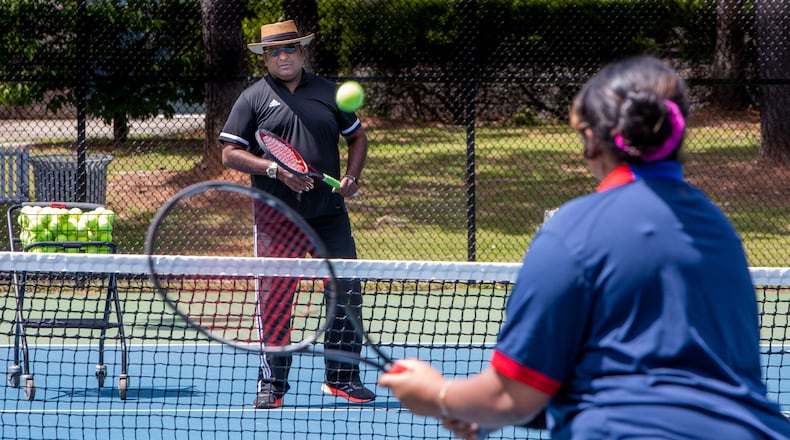Norcross tennis pro Francis Ali is still swinging a racket nearly four years after losing both of his legs.
Ali, who played competitively for his native Fiji in the late 1980s, hits the courts these days on artificial legs or prostheses.
He has been a tennis pro for more than 20 years in North Carolina, Mississippi, and Georgia, most recently at the Carl E. Sanders Family YMCA in Buckhead and Smokerise Country Club in Tucker.
He works with longtime players who want to sharpen their skills and with children who are just learning the game’s nuances. Long track pants conceal his artificial legs.
Some of his students notice that Ali walks with a slight limp, and, if they ask, he tells them how he lost his legs after his SUV slammed into the back of a commercial truck in Ohio in August 2017.
Credit: Phil Skinner
Credit: Phil Skinner
Joanne Truffleman, a lifelong tennis player who recently took lessons from Ali, said, “I almost fell on my face when he told me.”
“To think, out of all other professions he could have started after losing his legs, he went back to the most difficult – the sport of tennis and instructing,” she said. “I told him: “You are an inspiration.”
Ali’s mother, then a nurse at Emory University Hospital, had the tennis pro flown to Atlanta after his accident in 2017 so she could help care for him. He spent nine months recovering, he said.
Ali developed a love for tennis at age 13 that never waned. In his late teens, he was good enough to play competitively, representing his South Pacific homeland and seeing the world. The sport also opened the door for him to come to Atlanta to attend college.
Ali never made it to Wimbledon, the oldest and arguably most prestigious tennis event in the world. But he was at one time ranked 135th among the world’s teen tennis players.
Certified by the United States Professional Tennis Association, Ali has coached more than 50 teams to city finals and wins.
He was cheering and coaching from the sidelines in a wheelchair when his daughter, now a student and tennis player at Oglethorpe University, showed off her tennis talent at Gwinnett County’s Meadowcreek High School for three years.
“His ability to break down the nuances of tennis is something everyone should experience,” said Ken Ho, Brianna’s tennis coach at Meadowcreek. “Don’t underestimate him. Francis may have lost his legs, but he’ll still give you a run for your money on the tennis court.”
Ali said he tries to be a role model for his daughter.
“I devote all my time to her,” he said.
Ho said Ali enjoys the sport of tennis and what it can teach an athlete.
“You can see that in his daughter, Brianna,” said Ho, also a Meadowcreek counselor. “Despite her competitive drive to win on the court, she is one of the most caring and genuine athletes I’ve come across. Brianna sacrificed much of the little time she had to help teach new tennis players.”
Without the father/daughter duo, Meadowcreek’s tennis program “would not be what it is today,” Ho said.
Ali worked for several years after college for the International Tennis Federation in its Pacific Development Office, helping to develop tennis players on the junior level who could go on to play competitive tennis and then connect with a college in the U.S.
“I decided at a very early age that I wanted a teaching career rather than a playing career,” Ali said.
A playing career is expensive and requires deep-pocketed sponsors, he said.
At 51, Ali is on medical disability and only works part-time. He said he has to safeguard against working at venues with too many steps or sloping ground.
His daughter also is usually there, “helping me on the court, so I don’t have to walk around so much.”
Mobility is everything on the tennis court, Ali said.
“That’s the biggest challenge,” he said.
Although he does conceal his artificial legs on the court, Ali said he’s not all that troubled when someone asks: ‘What happened?’”
Once one person knows, “the word spreads like wildfire, and that way I don’t have to relay the story over and over,” Ali said. “It makes life easier.”
Some people ask why he’s back out on the tennis court.
“I tell them, ‘Well, it’s what I love to do.’”
Credit: Phil Skinner
Credit: Phil Skinner
What inspires Francis Ali
He says he loves being a role model for his daughter and has strong willpower to succeed.
“I love tennis as a sport for life. You can play this at any age. It has helped me travel the world and meet people.”
His advice to people with injuries or disabilities: “We need to accept our disability and learn to live with it. There’s strength in that.”
About the Author
Keep Reading
The Latest
Featured




